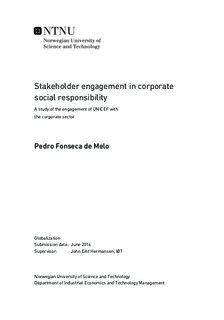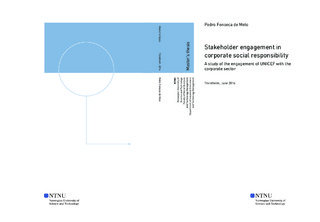| dc.description.abstract | ABSTRACT
In 2015, the United Nations launched the 2030 Agenda for Sustainable Development, a plan for action for people and planet. All countries and all stakeholders are encouraged to act in collaborative partnership in order to implement the Agenda. This study investigates the stakeholder aspect in corporate social responsibility and provides a qualitative analysis of the partnership between UNICEF and Telenor Group as an illustration. The study identified six themes and sub-themes concerning the research issue through analysis of documents and semi-structured interviews. These themes and sub-themes guided the process of analysis and, in combination with the theoretical framework, some observations and results emerged. On the conceptual level, there is not a single and overarching definition of CSR, as it is a multi-aspect concept. Companies need to find an intersection between their core business and society in a way this interaction creates shared value. In this context, stakeholder engagement is fundamental. The research identified that UNICEF is regarded by Telenor as a key external stakeholder. UNICEF and Telenor share common goals and are able to make a positive impact on children around the world through the partnership. Nowadays, the focus of the partnership is on fundraising and allocation of funds, and both parties acknowledge that there is room for improvement as the CSR and advocacy components of the partnership require further development. According to the results, it is mainly a matter of prioritization, (lack of) capacity and allocation of resources. Moreover, UNICEF needs to create indicators to measure non-financial engagements in order to motivate the integration of fundraising, advocacy and CSR in corporate partnerships.
Keywords: UNICEF, Telenor, corporate social responsibility, stakeholder engagement. | |

